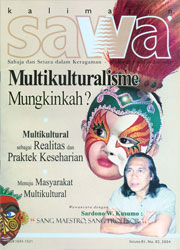This study aims at identifying the material scope of religious preaching and sermon in different mosques and religious teaching circles (majelis taklim) in Surakarta, identifying the multicultural aspects conveyed in the religious preaching and sermon, and exposing the management, including the resource persons, participants, and manuals.
The data consisted of religious preaches and sermons given in various mosques and religious teaching circles. The data-collecting methods included observation, documentation, and structured interview. The collected data were analyzed in descriptive-qualitative manner by using content analysis and discourse analysis techniques.
The result of the study showed the following conclusions. Firstly, the diversity of the society, whether in terms of ethnicity, culture, or religion, got little attention by different religious preachers in various mosques and religious teaching circles.
The religious preaches and sermons gave emphases on ethics, devotion, and faith representing the response to different phenomena indicating the moral degradation of the community, such as corruption, robbery, and other immoral acts, that induced different religious groups to set the priority on personality building by consequently implementing the Islamic teachings.
Secondly, instead of multicultural values, the religious preaches and sermons contained some anti-multicultural values, such as self-righteousness, prejudices and stereotypes of other groups, particularly in the relation with the non-Muslims and western countries, especially the United States of America. Non-Muslims were frequently paralleled with the concepts of nonbelievers (Kafir), heresies (Musyrik), Jews, and Christians. In addition, the western countries were considered identical with those concepts.
Thirdly, the subject of religious preaches and sermons implied the intensity of the purification movement. The purification movement increased during the second half of the twentieth century along with the popularity of the ideal of “Salaf al-shalih.”
Fourthly, along with the increasing intensity of the purification movement, the religious preaches and sermons implied the resistance against the local culture (Javanese), which was considered the main source of religious impurities.
Finally, the development of Islam in Surakarta implied the tendency of religious radicalism as reflected in the hostility towards the local culture, foreign (western) people, and non-Muslims.
Dr. M. Thoyibi, M.S., Dra. Yayah Khisbiyah, M.A., Drs. Abdullah Aly, M.Ag., Zakiyuddin Baidhawy, M.Ag.

